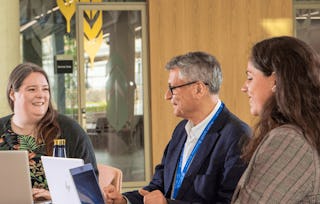How do firms lead successful digital transformations? The course answers the question. Developed by Professor Pankaj Setia at the Indian Institute of Management Ahmedabad (IIMA), the course teaches the professor’s well-renowned DaWoGoMo© model. To teach the model, Professor Setia explains many different examples of digital transformations, some involving advanced implementations of artificial intelligence. The course presents and highlights ways to successfully transform various aspects of organizations, to create a digital organization. For learners, the course imparts a way to think deeply and become familiar with various aspects that they may have to navigate, to successfully create, champion, or engage with a digital transformation. Real-life cases and scenarios enhance the learning experience

How to Transform Digitally?
Seize the savings! Get 40% off 3 months of Coursera Plus and full access to thousands of courses.

How to Transform Digitally?
This course is part of Advanced Digital Transformation Specialization

Instructor: Pankaj Setia
56,603 already enrolled
Included with
43 reviews
Recommended experience
What you'll learn
Prof Setia’s DaWoGoMo Model: Digital Architecture, Work, Governance, Business Models and Culture
Learn from organizational examples how advanced and cutting-edge operations are championed through digital technologies, such as AI technologies
Plan work transformation that architect advanced work system, such as those leveraging artificial intelligence-based technologies
Business Model Transformation: Appraise business models–such as those associated with digital platforms–and their ability to create value
Details to know

Add to your LinkedIn profile
See how employees at top companies are mastering in-demand skills

Build your subject-matter expertise
- Learn new concepts from industry experts
- Gain a foundational understanding of a subject or tool
- Develop job-relevant skills with hands-on projects
- Earn a shareable career certificate

There are 6 modules in this course
Earn a career certificate
Add this credential to your LinkedIn profile, resume, or CV. Share it on social media and in your performance review.
Instructor

Offered by
Explore more from Leadership and Management
 Status: Free Trial
Status: Free TrialIIMA - IIM Ahmedabad
 Status: Free Trial
Status: Free TrialUniversity of Glasgow
 Status: Free Trial
Status: Free TrialUniversity of Virginia
 Status: Free Trial
Status: Free TrialDartmouth College
Why people choose Coursera for their career

Felipe M.

Jennifer J.

Larry W.

Chaitanya A.
Learner reviews
- 5 stars
81.81%
- 4 stars
11.36%
- 3 stars
2.27%
- 2 stars
0%
- 1 star
4.54%
Showing 3 of 43
Reviewed on May 12, 2024
Excellent course. Very good presentation from Professor. Easy to understand.
Reviewed on Jul 29, 2025
The scientific approach, background with context and the detailed explanation by Professor Setia, makes this one of the greatest courses I have attended in my post graduate studies.
Reviewed on Feb 11, 2024
Very good course that drives thinking in both areas; theory and practical examples

Open new doors with Coursera Plus
Unlimited access to 10,000+ world-class courses, hands-on projects, and job-ready certificate programs - all included in your subscription
Advance your career with an online degree
Earn a degree from world-class universities - 100% online
Join over 3,400 global companies that choose Coursera for Business
Upskill your employees to excel in the digital economy
¹ Some assignments in this course are AI-graded. For these assignments, your data will be used in accordance with Coursera's Privacy Notice.

